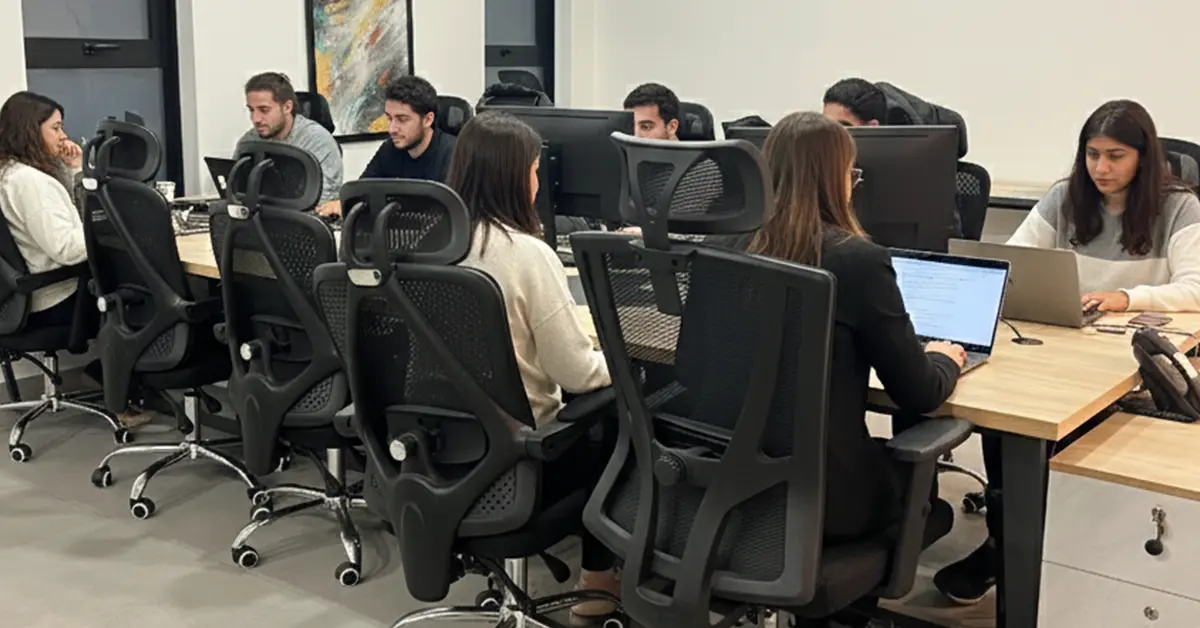You’ve got a brilliant business idea. The product is ready. Your first few clients are interested. Everything’s falling into place.
Then reality hits: Where will you actually work? This question kills more Pakistani startups than bad products or weak marketing. The office decision seems simple, but it gets complicated fast. Traditional offices demand huge upfront payments. Coffee shops become expensive and distracting. Working from home sounds free until you realize it’s destroying your productivity.
The Traditional Office Trap Nobody Warns You About
Renting an office feels like the “professional” thing to do. Your parents expect it. Your first investor might ask about it. Society says real businesses have real offices.
So you start looking. A decent space in Lahore costs around 50,000 per month. The landlord wants a month’s security deposit up front. That’s money gone before you unlock the door once.
But an empty room isn’t an office. You need desks, chairs, an internet connection, and basic furniture. Shopping for office furniture in Pakistan means visiting multiple stores, negotiating prices, arranging delivery, and assembling everything yourself. Two weeks disappear just setting things up.
Then electricity bills arrive. The summer months with air conditioning hit hard. Winter isn’t much better. Load shedding means you need a generator backup, or accept that work will stop during power cuts.
Internet connection requires its own setup fee, monthly charges, and constant troubleshooting when it inevitably stops working during important video calls.
Three months in, you’ve spent several lakhs. Your startup hasn’t generated revenue yet, but office costs keep piling up, whether business is good or terrible.
The worst part? You signed a lease. Even if you realize this office doesn’t make sense, you’re stuck paying for months.
Why Coffee Shop Freelancing Eventually Fails You
Some entrepreneurs skip traditional offices altogether. They grab laptops and head to coffee shops.
First week feels perfect. Good coffee, background music, and a change of scenery. Very entrepreneurial.
Second week, reality appears. That cappuccino costs four hundred rupees. You need to order something every few hours or feel guilty taking up space. Five days a week means spending thousands of dollars a month on overpriced drinks just to have somewhere to sit.
The WiFi is unreliable. Sometimes fast, usually slow, occasionally nonexistent. Good luck uploading that client presentation or joining a video meeting without freezing.
Noise becomes unbearable, someone’s loud phone conversation. Groups are having meetings at the following times. Music is suddenly getting louder during rush hours. You can’t control the environment, so the climate controls your productivity.
Privacy doesn’t exist. Strangers overhear every phone call. Every screen shares information with whoever walks past. Sensitive business discussions become impossible.
By month two, most entrepreneurs abandon coffee shops. The romance fades fast when you’re trying to build something real.
The Work From Home Illusion
Working from home sounds perfect on paper. Zero commute. Comfortable clothes. Free coffee. Your own bathroom.
Boundaries disappear. You check emails in bed. You take calls during dinner. You never really finish working because you never really leave the office. Work and life blur together until both suffer.
Productivity drops without an external structure. You start late because nobody’s watching. You take long breaks because distractions are everywhere. You convince yourself you’ll work tonight to make up for it, then don’t.
Clients don’t take you seriously when meetings are held at your dining table or when your home address appears on your business cards. It doesn’t look professional because it isn’t professional.
What Actually Makes Coworking Spaces Different
Coworking spaces solved the problems traditional offices create.
Instead of renting an entire office, you rent just the desk space you need. Instead of long-term contracts, you pay monthly or even weekly. Instead of setting up infrastructure, everything’s already working.
WorkPod in Lahore exemplifies this approach. Walk in and start working immediately. Fast internet is already connected. A comfortable desk and chair are ready. Meeting rooms are available when needed. Coffee made. Air conditioning is working. Power backup installed.
No furniture shopping. No internet troubleshooting. No maintenance coordination. No unexpected bills for things breaking.
You focus entirely on your business instead of managing office logistics.
The Real Cost Comparison
Traditional office for your first year means:
- Security deposit is eating up savings immediately
- Monthly rent that never decreases
- Furniture purchases all at once
- Internet and utility setup fees
- Ongoing electricity bills
- Maintenance and repairs
- Cleaning arrangements
- Random costs you didn’t expect
Coworking membership for your first year means:
- One monthly fee
- Everything included
- No surprise costs
- No maintenance headaches
- Scale up or down freely
The difference isn’t slight. You’ll save several lakhs annually by choosing coworking over traditional office space. That money significantly extends your runway, potentially keeping your startup alive through tough months when revenue is unpredictable.
For bootstrapped Pakistani entrepreneurs watching every rupee, this difference determines whether they survive or shut down.
Why Being Around Other Entrepreneurs Matters
Not a networking event, people reading name tags and handing out cards. Real people working on real problems at desks near yours.
The graphic designer three desks away might need exactly what your startup provides. The developer you chat with over coffee might know how to solve your technical problem. The woman running an e-commerce business might become your first advisor.
These connections happen naturally because you’re regularly in proximity. You see the same faces. You help each other with small things. Trust builds slowly through repeated interactions instead of forced networking.
One conversation leads to a referral. Another leads to a partnership. Someone introduces you to a potential client. Someone else shares information that saves you from a costly mistake.
This doesn’t happen when working from home. It rarely happens in coffee shops where people keep to themselves. It only happens in spaces designed for community.
WorkPod deliberately creates environments where these interactions occur naturally without feeling forced or awkward.
The Psychology Behind Why This Actually Works
Your brain learns patterns. When you always work in the same space where you sleep, watch TV, and relax, your brain gets confused about what that space means.
Result? You can’t focus properly during work hours. You can’t relax properly during rest hours. Everything blurs together.
Physically going to a workplace solves this. Your brain learns: this space means work. Home means rest. The separation creates mental clarity that improves both productivity and quality of life.
Dozens of entrepreneurs report the same experience. Struggled with focus at home. Moved to a coworking space. Suddenly, work became easier and more productive.
It’s not motivation or discipline. It’s environmental design helping your brain do what it naturally wants to do: focus when it’s work time, relax when it’s rest time.
Professional environments naturally elevate your standards. When everyone around you is focused and productive, you match that energy without conscious effort. The opposite happens in distracting environments, where your brain fights constant temptation to do something else.
Growing Without the Usual Headaches
Traditional offices force you to predict the future. Rent too much space and waste money. Rent too little and feel cramped. Either way, you’re stuck with your decision for the duration of the lease.
This operational flexibility becomes a competitive advantage. While other startups are locked into fixed overhead costs regardless of revenue, you optimize spending based on current reality.
The difference compounds over time. Small savings each month add up to survival during the inevitable rough patches every startup faces.
Why Location Matters More Than People Realize
Most coworking spaces sit in central, accessible areas. Easy for you to reach. Easy for clients to visit. Easy for team members to commute to.
Traditional offices go wherever you can afford rent, which often means less convenient locations. This creates hidden costs: longer commutes waste time, client meetings become logistically challenging, and attracting talent gets harder.
Being centrally located provides subtle advantages that compound. Easier to attend industry events. Easier to meet other entrepreneurs for coffee. Easier to handle unexpected in-person meetings. These conveniences enable opportunities that wouldn’t exist in a remote location.
The Practical Details That Make Daily Life Easier
Minor frustrations accumulate when you manage your own office. Air conditioning breaks during the summer. The Internet cuts out before an important call. Printer runs out of ink during deadline week. Each problem becomes your responsibility to solve.
Coworking spaces handle everything. Something breaks? Staff fixes it. Something runs out? Already restocked. You focus on your business rather than playing the role of facility manager.
Meeting rooms become available without the massive cost of maintaining your own. When clients or investors want to meet, you book a professional space for an hour. No awkward coffee shop meetings. No inviting people to your house. Just experienced, appropriate meeting spaces ready when needed.
How Pakistani Entrepreneurs Cracked the Code
Pakistan’s startup ecosystem continues to grow despite economic challenges. These entrepreneurs aren’t richer or luckier than previous generations. They’re just making smarter infrastructure decisions.
The old rule said you need your own office to be taken seriously. That rule is dead. What matters now is delivering real value to customers, not impressing people with office addresses.
Innovative entrepreneurs invest in product development, customer acquisition, and team building. Not into office overhead that doesn’t directly create value.
Coworking spaces lahore provide the base camp. A place to work, collaborate, meet, and grow without the crushing overhead that kills most startups before they find their footing.
Making the Right Choice for Your Situation
Coworking isn’t the answer for everyone. Manufacturing businesses need facilities. Very large teams might need dedicated space. Some industries have specific requirements that coworking can’t meet.
But if you’re building a digital business, running a small team, working on a tight budget, or needing operational flexibility, then coworking makes complete sense.
The Bottom Line
Starting a business in Pakistan is challenging enough. Don’t make it harder by burning savings on office costs that don’t directly grow your business.
The math is straightforward. The benefits are real. The flexibility matters. Pakistani entrepreneurs are choosing coworking because it simply makes more sense than the alternatives.
Traditional offices served their purpose once. That time passed. Better options exist now, and innovative entrepreneurs are taking advantage.
Your business deserves the best foundation possible. Choose infrastructure that helps you grow instead of holding you back.
FAQs
How much can I actually save by using coworking instead of a traditional office?
Most entrepreneurs save several lakh rupees in the first year alone. Traditional offices require huge upfront costs for deposits, furniture, and setup, plus ongoing high monthly expenses for rent, utilities, and maintenance. Coworking gives you everything for one predictable monthly fee that’s typically much lower than just the rent of traditional space, before even counting all the extra costs traditional offices require.
Can I meet clients at coworking spaces, or would that be unprofessional?
Meeting clients at coworking spaces is entirely professional and often better than alternatives. You book a proper meeting room, have your discussion in a professional setting, and clients see you’re running a real business. This beats coffee shop meetings or inviting clients to your home. Quality coworking spaces like WorkPod specifically design meeting rooms for precisely this purpose.
What if coworking spaces are too noisy for me to concentrate?
Good coworking spaces create different zones for different work styles. Quiet areas for focused work. Collaboration zones for discussions. Meeting rooms for calls. If you need complete silence daily, consider a private office within the coworking space. This costs more than shared desks but still much less than traditional offices, while keeping all the benefits like flexibility and community.
Is coworking actually secure for handling business information?
For most businesses, yes. Use basic common sense security: headphones for sensitive calls, don’t leave documents lying around, and lock your laptop when stepping away. If you regularly handle highly confidential information, consider private office options within coworking spaces rather than open desks. This gives you the security you need while maintaining all the other coworking advantages.







